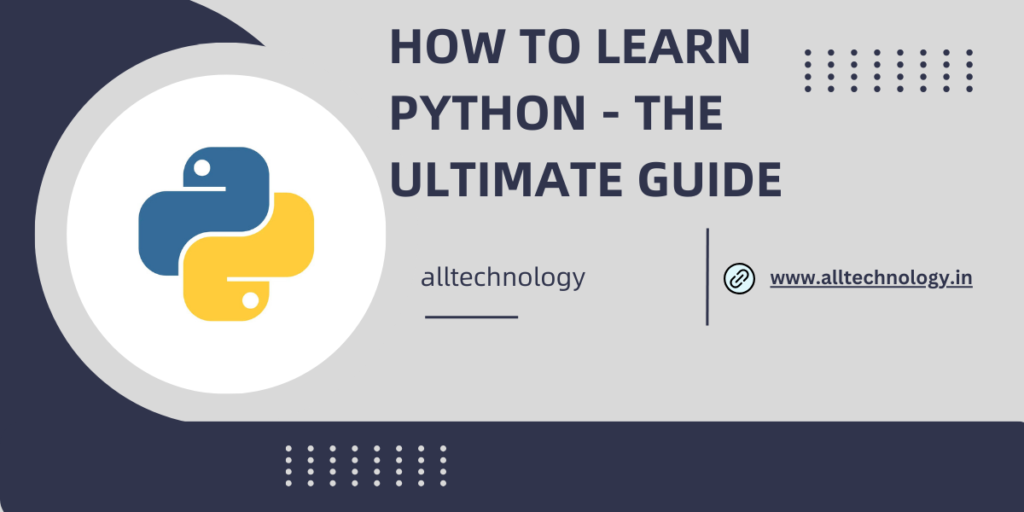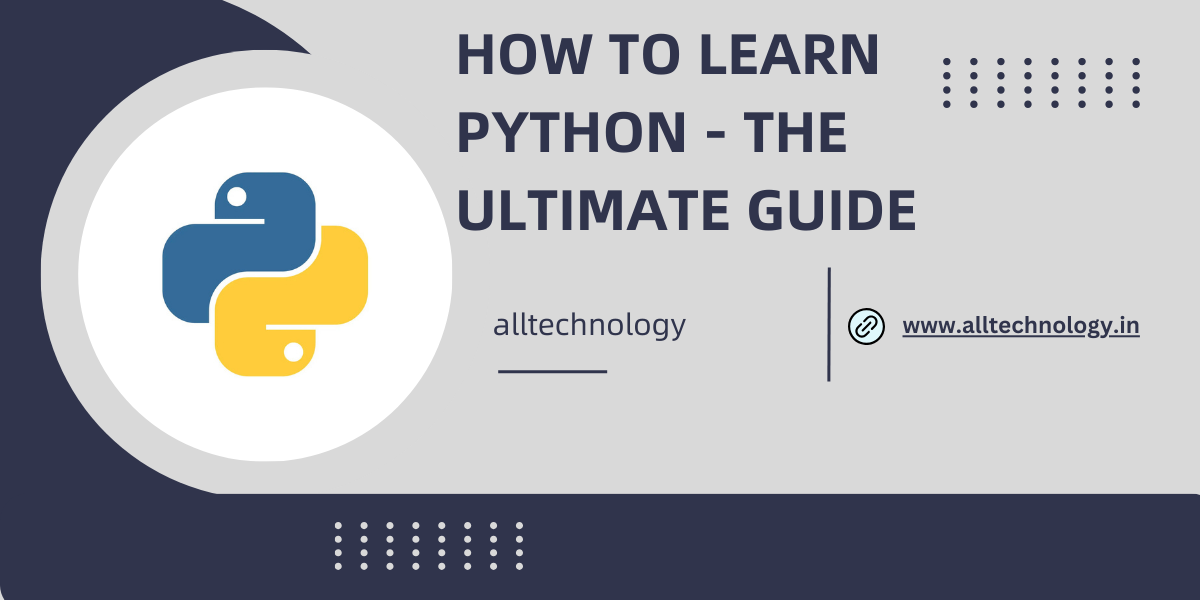Introduction
Hello Bloggers welcome alltechnology blog. In this blog you will learn How to Learn Python – The Ultimate Guide. Embarking on the journey of learning Python can be both exhilarating and daunting. With its versatility and power, Python has become one of the most sought-after programming languages in the world. Whether you’re a complete beginner or an experienced coder looking to expand your skill set, mastering Python opens doors to a myriad of opportunities in software development, data science, artificial intelligence, and beyond. In this comprehensive guide, we’ll delve into the intricacies of Python learning, unraveling its complexities while embracing the diverse landscape of learning methodologies.
Python –
Python is a computer programming language often used to build websites and software, automate tasks, and analyze data.

- Python: Unraveling the Enigma
Let’s kick things off by delving into the enigmatic realm of Python. What makes Python stand out from the myriad of programming languages crowding the digital landscape? The answer lies in its elegance, simplicity, and versatility. Python’s syntax, akin to a linguistic masterpiece, reads like poetry to both seasoned developers and coding novices alike. Its intuitive design fosters a seamless learning experience, allowing enthusiasts to swiftly grasp its concepts and wield its power with finesse.
- Embrace the Pythonic Paradigm
Now that we’ve acquainted ourselves with Python’s allure, it’s time to embrace the Pythonic paradigm. But what exactly does that entail? Picture a tapestry woven with threads of efficiency, readability, and scalability—this is the essence of Pythonic programming. As you traverse the labyrinth of Python syntax, remember to adhere to the Zen of Python, a set of guiding principles that illuminate the path to code enlightenment. Embrace the beauty of simplicity, cherish the elegance of clarity, and honor the spirit of Pythonic wisdom.
- Mastering the Pythonic Toolbox
Equip yourself with an arsenal of Pythonic tools poised to unleash your coding prowess upon the digital landscape. From data structures to control flow, from functions to classes, each component of Python’s toolkit serves as a catalyst for innovation and exploration. Dive headfirst into the depths of list comprehensions, soar to new heights with generator expressions, and navigate the intricacies of object-oriented programming with grace and precision. Remember, the journey to mastery is paved with curiosity, persistence, and a dash of Pythonic ingenuity.
- Navigating the Python Ecosystem
As you traverse the vast expanse of the Python ecosystem, prepare to encounter a myriad of libraries, frameworks, and utilities beckoning you to expand your horizons. Whether you’re venturing into the realm of web development with Django, exploring the world of scientific computing with NumPy and SciPy, or diving into the realm of machine learning with TensorFlow and PyTorch, Python offers a treasure trove of resources awaiting your discovery. Embrace the spirit of exploration, experiment fearlessly, and let your imagination soar as you chart your course through the ever-evolving Python landscape.
- Community: The Heartbeat of Python
No exploration of Python would be complete without acknowledging the vibrant and welcoming community that serves as its lifeblood. From online forums to local meetups, from open-source contributions to collaborative projects, the Python community embodies the ethos of inclusivity, camaraderie, and shared knowledge. Whether you’re seeking guidance, sharing insights, or simply connecting with like-minded individuals, the Python community stands ready to embrace you with open arms. So, immerse yourself in the rich tapestry of Python culture, forge meaningful connections, and embark on a journey of growth, learning, and discovery.
- Understanding Python’s Versatility: Python’s versatility is unparalleled. From web development to data science, artificial intelligence to automation, Python is the go-to language for developers worldwide. Its clean syntax and readability make it accessible to beginners, while its powerful libraries and frameworks cater to the needs of seasoned professionals.
- Setting Up Your Python Environment: Before you start coding in Python, you need to set up your development environment. You have options aplenty – from installing Python locally on your machine to using cloud-based IDEs like Google Colab or Jupyter Notebooks. Each option comes with its advantages and trade-offs, so choose the one that best suits your needs.
- Mastering the Basics: Every Python journey begins with mastering the basics. Get comfortable with variables, data types, and operators. Understand how to control the flow of your programs using conditional statements and loops. Embrace functions and learn to modularize your code for better organization and reusability.
- Exploring Python’s Ecosystem: Python’s strength lies in its vast ecosystem of libraries and frameworks. Dive into popular libraries like NumPy and Pandas for data manipulation, Matplotlib and Seaborn for data visualization, and TensorFlow and PyTorch for machine learning and deep learning. Explore web frameworks like Django and Flask for building powerful web applications.
- Embracing Project-Based Learning: Theory is essential, but practical experience is paramount. Embrace project-based learning to reinforce your Python skills. Build a web scraper to extract data from websites, develop a chatbot using natural language processing, or create a machine learning model to predict stock prices. The possibilities are endless, and the learning never stops.
- Engaging with the Python Community: The Python community is vibrant and welcoming. Join online forums like Stack Overflow and Reddit to seek help, share knowledge, and connect with fellow Python enthusiasts. Attend Python meetups, conferences, and workshops to network with industry professionals and stay updated on the latest trends and developments.
- Continuing Your Python Journey: Learning Python is not a destination; it’s a journey. Stay curious and never stop learning. Explore advanced topics like object-oriented programming, multithreading, and asynchronous programming. Contribute to open-source projects to hone your skills and give back to the community. The more you immerse yourself in Python, the more rewarding your journey will be.
conclusion
learning Python is more than just acquiring a new skill—it’s embarking on a transformative journey that transcends the boundaries of code and computation. With the right mindset, resources, and community support, you have the power to unlock a world of endless possibilities and chart a course towards a future limited only by the bounds of your imagination. So, what are you waiting for? Dive headfirst into the Pythonic abyss, and let the adventure begin!
